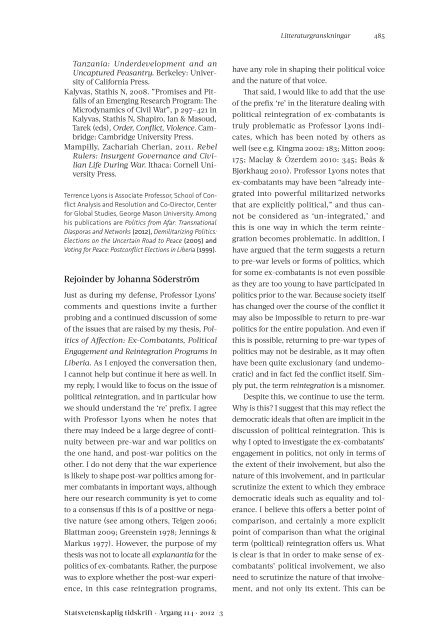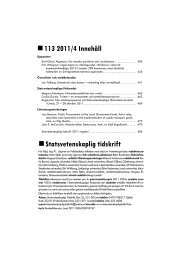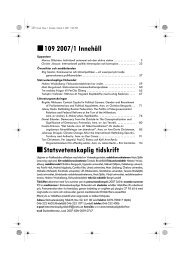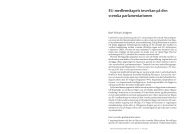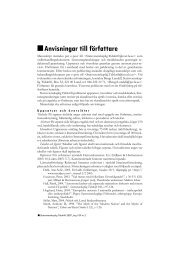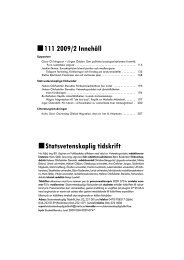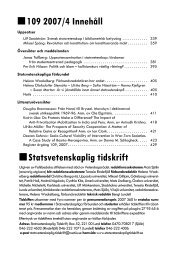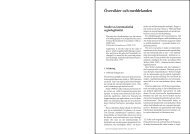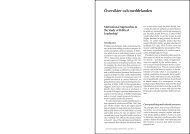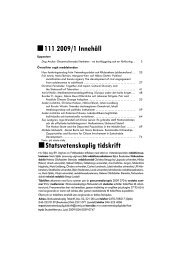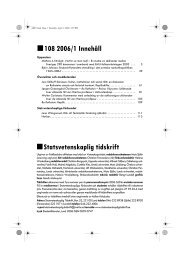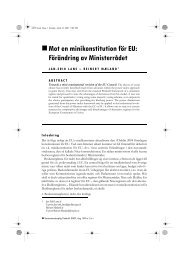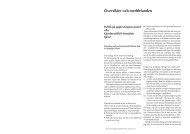Helt nummer 2012/3 (PDF, 1387 kb) - Statsvetenskaplig tidskrift
Helt nummer 2012/3 (PDF, 1387 kb) - Statsvetenskaplig tidskrift
Helt nummer 2012/3 (PDF, 1387 kb) - Statsvetenskaplig tidskrift
You also want an ePaper? Increase the reach of your titles
YUMPU automatically turns print PDFs into web optimized ePapers that Google loves.
Tanzania: Underdevelopment and an<br />
Uncaptured Peasantry. Berkeley: University<br />
of California Press.<br />
Kalyvas, Stathis N, 2008. ”Promises and Pitfalls<br />
of an Emerging Research Program: The<br />
Microdynamics of Civil War”, p 297–421 in<br />
Kalyvas, Stathis N, Shapiro, Ian & Masoud,<br />
Tarek (eds), Order, Conflict, Violence. Cambridge:<br />
Cambridge University Press.<br />
Mampilly, Zachariah Cherian, 2011. Rebel<br />
Rulers: Insurgent Governance and Civilian<br />
Life During War. Ithaca: Cornell University<br />
Press.<br />
Terrence Lyons is Associate Professor, School of Conflict<br />
Analysis and Resolution and Co-Director, Center<br />
for Global Studies, George Mason University. Among<br />
his publications are Politics from Afar: Transnational<br />
Diasporas and Networks (<strong>2012</strong>), Demilitarizing Politics:<br />
Elections on the Uncertain Road to Peace (2005) and<br />
Voting for Peace: Postconflict Elections in Liberia (1999).<br />
Rejoinder by Johanna Söderström<br />
Just as during my defense, Professor Lyons’<br />
comments and questions invite a further<br />
probing and a continued discussion of some<br />
of the issues that are raised by my thesis, Pol-<br />
itics of Affection: Ex-Combatants, Political<br />
Engagement and Reintegration Programs in<br />
Liberia. As I enjoyed the conversation then,<br />
I cannot help but continue it here as well. In<br />
my reply, I would like to focus on the issue of<br />
political reintegration, and in particular how<br />
we should understand the ‘re’ prefix. I agree<br />
with Professor Lyons when he notes that<br />
there may indeed be a large degree of conti-<br />
nuity between pre-war and war politics on<br />
the one hand, and post-war politics on the<br />
other. I do not deny that the war experience<br />
is likely to shape post-war politics among for-<br />
mer combatants in important ways, although<br />
here our research community is yet to come<br />
to a consensus if this is of a positive or nega-<br />
tive nature (see among others, Teigen 2006;<br />
Blattman 2009; Greenstein 1978; Jennings &<br />
Markus 1977). However, the purpose of my<br />
thesis was not to locate all explanantia for the<br />
politics of ex-combatants. Rather, the purpose<br />
was to explore whether the post-war experi-<br />
ence, in this case reintegration programs,<br />
<strong>Statsvetenskaplig</strong> <strong>tidskrift</strong> · Årgång 114 · <strong>2012</strong> / 3<br />
Litteraturgranskningar 485<br />
have any role in shaping their political voice<br />
and the nature of that voice.<br />
That said, I would like to add that the use<br />
of the prefix ‘re’ in the literature dealing with<br />
political reintegration of ex-combatants is<br />
truly problematic as Professor Lyons indi-<br />
cates, which has been noted by others as<br />
well (see e.g. Kingma 2002: 183; Mitton 2009:<br />
175; Maclay & Özerdem 2010: 345; Bøås &<br />
Bjørkhaug 2010). Professor Lyons notes that<br />
ex-combatants may have been “already inte-<br />
grated into powerful militarized networks<br />
that are explicitly political,” and thus can-<br />
not be considered as ‘un-integrated,’ and<br />
this is one way in which the term reinte-<br />
gration becomes problematic. In addition, I<br />
have argued that the term suggests a return<br />
to pre-war levels or forms of politics, which<br />
for some ex-combatants is not even possible<br />
as they are too young to have participated in<br />
politics prior to the war. Because society itself<br />
has changed over the course of the conflict it<br />
may also be impossible to return to pre-war<br />
politics for the entire population. And even if<br />
this is possible, returning to pre-war types of<br />
politics may not be desirable, as it may often<br />
have been quite exclusionary (and undemo-<br />
cratic) and in fact fed the conflict itself. Sim-<br />
ply put, the term reintegration is a misnomer.<br />
Despite this, we continue to use the term.<br />
Why is this? I suggest that this may reflect the<br />
democratic ideals that often are implicit in the<br />
discussion of political reintegration. This is<br />
why I opted to investigate the ex-combatants’<br />
engagement in politics, not only in terms of<br />
the extent of their involvement, but also the<br />
nature of this involvement, and in particular<br />
scrutinize the extent to which they embrace<br />
democratic ideals such as equality and tol-<br />
erance. I believe this offers a better point of<br />
comparison, and certainly a more explicit<br />
point of comparison than what the original<br />
term (political) reintegration offers us. What<br />
is clear is that in order to make sense of ex-<br />
combatants’ political involvement, we also<br />
need to scrutinize the nature of that involve-<br />
ment, and not only its extent. This can be


